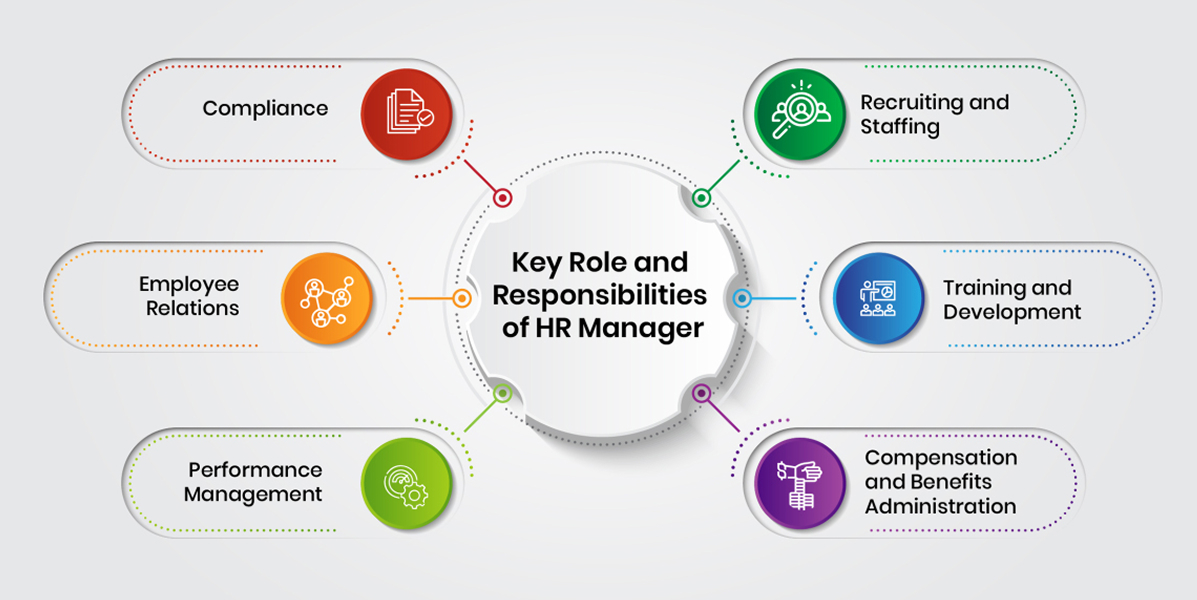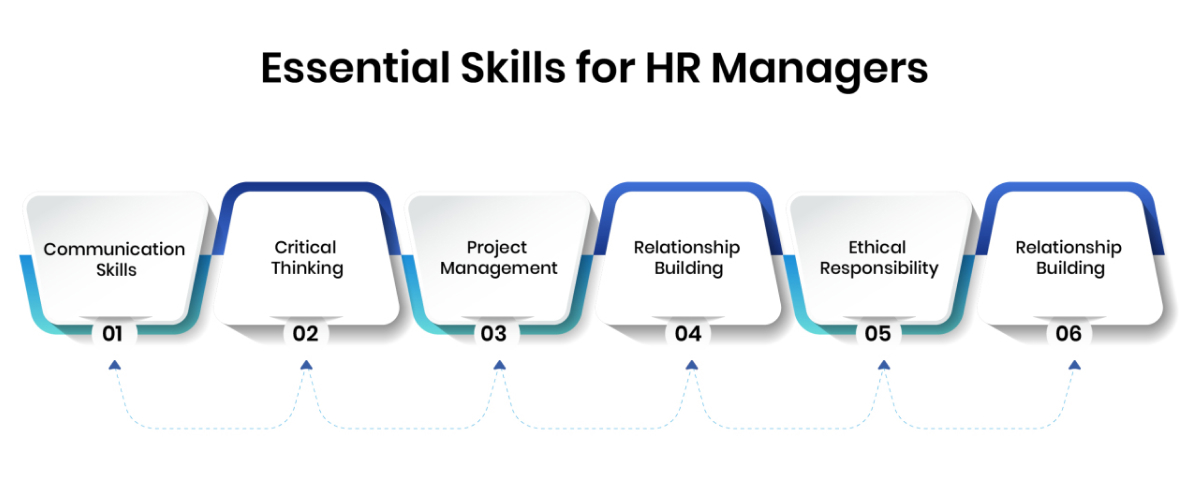The Complete Guide to Becoming an HR Manager
April 07, 2025

Human resources (HR) management is a growing field focused on recruiting, supporting, and managing employees within an organization. HR managers play a critical role in this process by handling the day-to-day operations of HR departments.
If you’re interested in a management career at the intersection of business operations and people operations, becoming an HR manager may be a great path for you. This comprehensive guide covers everything you need to know, from main responsibilities to top skills and potential career trajectories. .
HR Manager Role and Responsibilities
The HR Manager plays a critical role in overseeing and managing human resources operations within an organization. As a key member of the leadership team, the HR Manager serves as an advocate for both the business and its employees. From hiring and onboarding to performance management and retention initiatives, the HR Manager handles a wide spectrum of people-focused responsibilities.

Key duties typically include:
Recruiting and Staffing
A core duty of the HR Manager is to plan and lead recruiting efforts to attract, source and hire qualified talent to meet the organization’s human capital needs. Key responsibilities include:
-
Working closely with departmental managers to understand hiring requirements and personnel gaps within business units
-
Crafting comprehensive and appealing job descriptions that accurately outline role responsibilities, requirements, qualifications and company culture
-
Determining the best approaches for sourcing candidates, whether through online job boards, employee referrals, recruiting agencies or other pipelines
-
Managing logistics of recruitment process from screening resumes to conducting interviews and assessments
-
Extending job offers to selected candidates and negotiating salary and benefits
-
Overseeing background verification checks and related onboarding paperwork
-
Developing engaging and informative onboarding programs to smoothly integrate new hires
Training and Development
As a strategic advisor on human capital development, the HR Manager plays an integral role in assessing organizational training needs and bolstering the skills and competencies of the workforce through:
-
Conducting training needs analyses by department, function or role
-
Designing or sourcing training programs and materials tailored to bridge skills gap
-
Implementing employee training initiatives, whether through online modules, seminars, workshops or external development opportunities
-
Coaching and mentoring managers and employees at all levels to improve leadership, performance and engagement
-
Partnering with departmental managers to create employee development plans that support growth and progression
-
Tracking program efficacy through surveys, observation or other feedback mechanisms
Compensation and Benefits Administration
To attract and retain top talent, organizations must offer equitable and competitive compensation packages. Key aspects overseen by the HR Manager include:
-
Researching prevailing market rates for similar roles using salary benchmarking surveys.
-
Developing compensation structures and pay bands aligned to job scope and qualifications.
-
Administering pay raises, bonuses and other monetary rewards programs tied to performance outcomes.
-
Processing payroll changes and issues in an accurate and timely manner.
-
Managing employee health insurance, retirement savings, paid time off and other benefits offerings, including enrollments, terminations and modifications .
-
Ensuring all compensation and benefits practices align with laws around wages, tax withholding and so forth .
Performance Management
Measuring and optimizing employee productivity and effectiveness is a vital process led by the HR Manager. Among core responsibilities:
-
Establishing performance standards, key performance indicators and expectations for roles.
-
Implementing processes to evaluate employee productivity, achievements and areas for improvement .
-
Conducting periodic performance reviews and providing constructive feedback.
-
Working with managers to create targeted performance improvement plans for struggling employees.
-
Tracking key metrics around individual and organization-wide productivity.
-
Celebrating successes through monetary rewards or recognitions programs.
Employee Relations
The HR Manager often serves as the first point of contact for employee questions or conflicts. Key duties include:
-
Listening to employee grievances and guiding constructive conflict resolution discussions.
-
Investigating workplace issues from compensation concerns to interpersonal disputes.
-
Upholding organizational core values and culture standards through all interactions.
-
Consulting with company leadership on sensitive employee matters requiring guidance.
-
Making fair and objective recommendations in cases requiring disciplinary action.
Compliance
Maintaining legal and ethical integrity around all human resources practices is paramount. As such, the HR Manager is responsible for:
-
Overseeing workplace activities from hiring and compensation to terminations to safeguard adherence to labor laws
-
Maintaining comprehensive and up-to-date employee policy handbooks covering code of conduct, discrimination, safety protocols and more
-
Understanding the latest developments in employment legislation
-
Updating policies and programs to align with changes in laws and regulations
-
Ensuring the protection of employee personal information and confidential data
HR managers often oversee a team of HR coordinators and specialists focused on specific areas like recruiting, compensation, or training. However, in smaller companies, the HR manager may perform all duties themselves
This role requires excellent communication skills, business acumen, and the ability to balance employee advocacy with company interests. HR managers interact regularly with all staff levels.
Essential Skills for HR Managers
Succeeding in this multifaceted people-focused role requires well-rounded HR skills, including:

-
Communication Skills: From daily emails to conducting sensitive investigations, clear verbal and written communication is imperative.
-
Critical Thinking: Assess complex situations that involve legal considerations, business objectives, financial constraints, and interpersonal dynamics.
-
Project Management: Juggle competing priorities and manage HR projects effectively, from start to finish.
-
Relationship Building: Develop trust and rapport with executives, managers, and employees company-wide.
-
Ethical Responsibility: Handle confidential information with integrity and make fair decisions.
-
Business Acumen: Understand the company’s objectives and operations to provide relevant HR guidance.
HR managers must stay up to date on the latest HR best practices, employment laws, and workplace trends as well.
Education and Career Path: How to Become an HR Manager and Advance in Your Career
A bachelor's degree in human resources, business administration, psychology, or communications provides a strong foundation for a career in human resources. Coursework typically covers areas like employment law, compensation, organizational behavior, training, labor relations, and benefits administration. Many aspiring HR professionals choose to further their education with a Master of Human Resources or Business Administration which enables them to qualify for higher-level positions. Professional certifications such as the STMPTM, SHRM-CP or PHR certifications are also extremely valuable for advancing one's HR career.
Typical career advancement pathways in HR career path include:
-
HR Assistant/Coordinator - The first role many HR professionals hold is that of an HR assistant or coordinator. In this entry-level capacity, responsibilities involve providing administrative and clerical support to the HR team by assisting with tasks like recordkeeping, reporting, event planning coordination, and onboarding new hires. This role offers the opportunity to learn the fundamentals of HR.
-
HR Generalist - The next step is often an HR generalist role, which handles the full scope of HR responsibilities at an operational level. HR generalists recruit candidates, handle employee relations issues, process payroll, oversee benefits enrollment, ensure legal/regulatory compliance, and may provide training. Generalists work across the entire employee lifecycle.
-
HR Manager - After obtaining well-rounded operational experience, HR professionals may transition into a management role overseeing a team of HR specialists and assistants. HR managers provide input on policies/programs aligned to business goals, monitor department performance metrics, and report on HR initiatives to executives. They coordinate major activities like compensation planning, talent acquisition, and succession management.
-
Head of HR/CHRO - The pinnacle role within the HR function is Head of HR or Chief Human Resources Officer. These executive-level positions are responsible for the entire HR department, developing overarching HR strategies, fostering a positive workplace culture that attracts top talent, advising organizational leadership, and ensuring that all HR programs add value. They lead a team of HR Business Partners and managers while reporting directly to the CEO and Board of Directors on HR matters impacting the business.
Through this trajectory, HR managers can rise to senior manager or director levels with enough experience. They may also move into related business leadership roles.
Future Outlook
The U.S. Bureau of Labor Statistics predicts HR manager jobs will grow by 6% from 2023 to 2033—much faster than average across all occupations. This increase correlates with business expansion and the growing strategic influence of human resources within companies.
Beyond domain expertise, HR managers need adaptable “future of work” capabilities like data literacy, technology aptitude, and creative problem-solving to continue adding value in our rapidly evolving work landscape.
Yet best practices remain centered on the fundamentals: supporting people, fostering positive employee experiences, upholding legal/ethical standards, and aligning talent priorities with overarching business goals.
By developing expertise across essential HR functions and honing leadership capabilities, aspiring professionals can pave the way for an engaging and dynamic management career.
Human Resources offers attractive opportunities to guide people strategy while gaining broad exposure to how successful businesses operate. If you’re passionate about talent and have strong critical thinking, communication, and people skills, the HR manager role provides an impactful avenue to pursue your professional goals.


